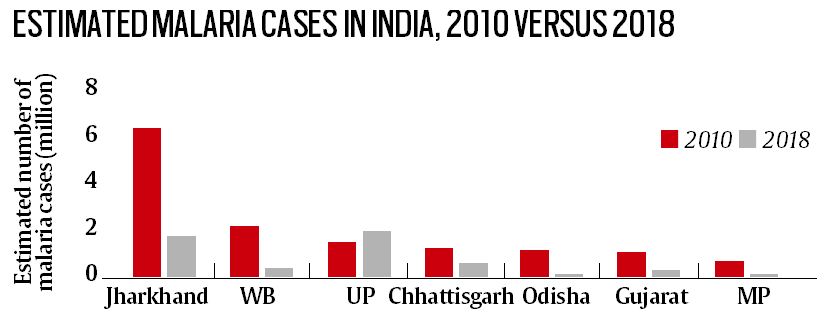Indian Economy
Bharat Bond Exchange Traded Fund
The Cabinet Committee on Economic Affairs, chaired by the Prime Minister of India, has approved the Government’s plan to create and launch India’s first corporate bond Exchange Traded Fund (ETF) — Bharat Bond ETF.
- The Fund will provide additional source of money for Central Public Sector Undertakings (CPSUs) Central Public Sector Enterprises (CPSEs), Central Public Financial Institutions (CPFIs) and other Government organizations to meet their borrowing requirements, apart from bank financing.
Exchange Traded Fund
- An Exchange-Traded Fund (ETF) is a basket of securities that trade on an exchange, just like a stock.
- ETF reflects the composition of an Index, like BSE Sensex. Its trading value is based on the Net Asset Value (NAV) of the underlying stocks (such as shares) that it represents.
- ETF share prices fluctuate all day as it is bought and sold. This is different from mutual funds that only trade once a day after the market closes.
- An ETF can own hundreds or thousands of stocks across various industries, or it could be isolated to one particular industry or sector.
- Bond ETFs are a type of ETFs which may include government bonds, corporate bonds, and state and local bonds—called municipal bonds.
- A bond is an instrument that represents a loan made by an investor to a borrower (typically corporate or governmental).
- Besides being cost efficient, ETFs offer a diversified investment portfolio to investors.
Features of Bharat Bond ETF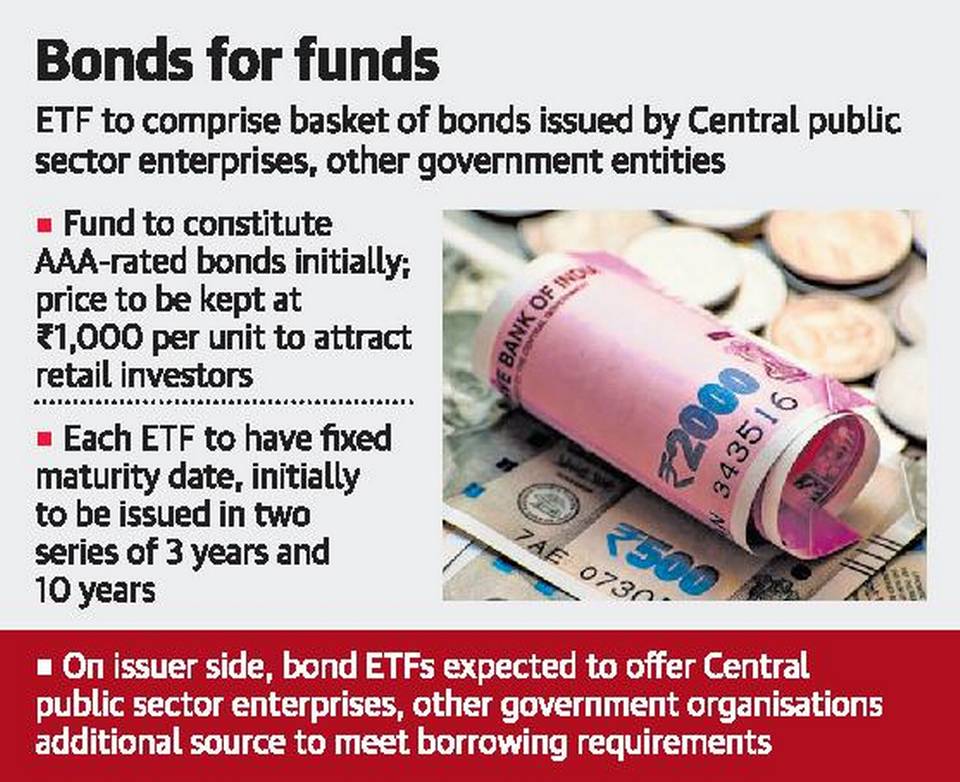
- The ETF will comprise a basket of bonds issued by the CPSEs, CPSUs, CPFIs, and other government organisations.
- The unit size of the bond has been kept at just ₹1,000 so that even retail investors can invest.
- Each ETF will have a fixed maturity date and initially they will be issued in two series, of 3 years and 10 years. Each series will have a separate index of the same maturity series.
- Index will be constructed by an independent index provider – National Stock Exchange.
Advantages
- The Bharat Bond ETF will ensure broader investor base through the participation of retail and High Networth Individuals (HNI).This will lead to an increase in the demand for bonds, thus reducing the cost of borrowing for borrowers i.e. government organizations.
- The Bond ETF will provide safety, liquidity and predictable tax efficient returns.
- The launch of this ETF is expected to eventually increase the size of bond ETFs in India leading to achieving key objectives at a larger scale - deepening bond markets, enhancing retail participation and reducing borrowing costs.
Governance
World Malaria Report, 2019
Why in News
The World Health Organisation (WHO) has released the World Malaria Report, 2019.
- The report provides a comprehensive update on global and regional malaria data and trends including prevention, diagnosis, treatment, elimination and surveillance.
- According to the report, 228 million cases of malaria are observed worldwide, down from 251 million cases in 2010.
- Highest Burden: India along with 19 countries in sub-Saharan Africa carried almost 85% of the global malaria burden.
- Though India has observed the largest absolute reductions among the countries that share 85% of the malaria burden.
Key Points
- Global Analysis:
- Incidence rate: It has declined globally between 2010 and 2018, from 71 to 57 cases per 1000 population.
- Deaths: The number of deaths due to malaria has decreased globally. (405,000 deaths in 2018 from 416,000 deaths in 2017).
- National Analysis:
- Incidence rate: India reported 2.6 million fewer cases in 2018 compared to 2017. Thus the overall incidence of malaria in the country has reduced.
- However, 7 states (Uttar Pradesh, Jharkhand, Chhattisgarh, West Bengal, Gujarat, Odisha and Madhya Pradesh) account for about 90% of the burden of malaria cases in India.
- Deaths: Overall number of deaths due to malaria in India have reduced.
- Incidence rate: India reported 2.6 million fewer cases in 2018 compared to 2017. Thus the overall incidence of malaria in the country has reduced.
Steps taken at the global level
- WHO’s Global Technical Strategy for Malaria, 2016-2030.
- WHO has also released a new country-driven approach–“High burden to high impact” to enhance response to malaria in countries where malaria cases increased in 2018 as compared to 2017
Steps taken by the Indian government
- National Strategic Plan for Malaria Elimination (NSPME) (2017-22)
- The Strategic Plan gives year wise elimination targets in various parts of the country depending upon the endemicity of malaria in the next 5 years.
- It is based on the National Framework for Malaria Elimination 2016 which is in line with WHO’s Global Technical Strategy for Malaria, 2016-2030.
- Indian Council of Medical Research (ICMR) has established ‘Malaria Elimination Research Alliance-India (MERA-India) which is a conglomeration of partners working on malaria control.
Malaria
- Malaria is caused by Plasmodium parasites.
- The parasites are spread to people through the bites of infected female Anopheles mosquitoes, called "malaria vectors",
- World Malaria Day is observed on 25th April.
- It can be noted that WHO officially endorses disease-specific global awareness days for only four diseases viz. HIV-AIDS, TB, Malaria, and Hepatitis.
Indian Polity
Right To A Fair Trial
Why in News
The Supreme Court (SC), in a recent verdict, has held that the routine practice of investigating agencies of producing documents in sealed covers and the judges reproducing them as judicial findings of their own will affect the right to a fair trial of accused.
Key Points
- Routine Practice:
- The apex court reacted sharply to the recent trend of agencies like the CBI and the Enforcement Directorate presenting documents in sealed covers to the courts, as evidence collected against the accused in the course of investigation.
- The situation is made worse when judges convert the findings of the investigative agencies in these documents into their own judicial findings and reproduce them in orders, refusing the accused bail.
- Verdict
- The Supreme Court in the specific case held that though it was open for a judge to receive the materials/documents collected during the investigation in order to either “satisfy its conscience that the investigation is proceeding on the right lines” or to grant bail, the judge cannot reproduce the material as his own findings in a judicial order.
- It would be against the concept of a fair trial if in every case the prosecution presents documents in sealed cover and the findings on the same are recorded as if the offence is committed and the same is treated as having a bearing for denial or grant of bail.
- The merits of a case should be left for the trial where the accused can defend himself.
Rights of an Accused under Indian Constitution
- Article 22 of the Indian Constitution confers the following rights on a person who is arrested or detained under an ordinary law:
- Right to be informed of the grounds of arrest.
- Right to consult and be defended by a legal practitioner.
- Right to be produced before a magistrate within 24 hours, excluding the journey time.
- Right to be released after 24 hours unless the magistrate authorises further detention.
- It needs to be noted that the above safeguards are not available to an enemy alien or a person arrested or detained under a preventive detention law.
Biodiversity & Environment
Global Climate Risk Index 2020
Why in News
The international environmental think tank ‘Germanwatch’ has recently released the Global Climate Risk Index 2019.
- The index analyses the extent to which countries and regions have been affected by the impacts of weather-related loss events (storms, floods, heat waves etc.).
Key Findings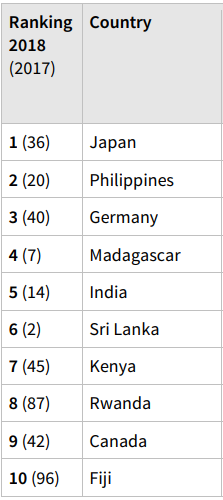
- Worst affected in 2018: Japan, Philippines and Germany
- Worst affected between 1999-2018 (long-term index): Puerto Rico, Myanmar and Haiti
- Deaths and financial loss between 1999-2018: Altogether, about 5 lakh people died as a direct result of more than 12 000 extreme weather events globally. Losses amounted to around US$ 3.54 trillion (in purchasing power parities).
- Poor countries had to face much higher impacts: Of the ten most affected countries and territories in the period 1999-2018, seven were developing countries in the low income or lower-middle income country group, two were classified as upper-middle income countries (Thailand and Dominica) and one was an advanced economy generating high income (Puerto Rico).
- Link between climate change and the frequency & severity of extreme heat: Heatwaves were one major cause of damage in 2018.
- Of the ten most affected countries in 2018, Germany, Japan and India were suffering from extended periods of heat.
- Across Europe, extreme heat spells are now up to 100 times more likely than a century ago.
- Impact of heatwaves on African countries may be under-represented due to a lack of data.
India
- India, which suffered water shortages, crop failures and worst flooding, holds the 5th position. It has fallen from its 14th rank of countries hit most by climate change-induced weather phenomena in 2017.
- India has also recorded the highest number of fatalities due to climate change and the second-highest monetary losses from its impact in 2018.
Suggestions
- The 2019 Climate Summit in Madrid needs to address the lack of additional climate finance to help the poorest people and countries to address loss and damage.
- These countries are more vulnerable to the damaging effects of a hazard but have lower coping capacity.
- The climate summit needs to result in:
- a decision on how the need for support for vulnerable countries concerning future loss and damage is to be determined on an ongoing basis
- the necessary steps to generate and make available financial resources to meet these needs
- strengthening the implementation of measures for adapting to climate change
Germanwatch
Germanwatch, based in Bonn and Berlin (Germany), is an independent development and environmental organisation which works for sustainable global development.
Important Facts For Prelims
Extra Neutral Alcohol
Why in News
Alcohol manufacturers have written to NITI Aayog asking for reduction in import duty so as they can import Extra Neutral Alcohol (ENA) from global markets cost effectively.
- Like ethanol, ENA is a byproduct of the sugar industry, and is formed from molasses that are a residue of sugarcane processing.
- The ENA market in India stood at a volume of 2.9 billion litres in 2018.
Uses of Extra Neutral Alcohol
- ENA is the primary raw material for making alcoholic beverages such as whisky, vodka etc.
- It serves as an essential ingredient in the manufacture of cosmetics and personal care products such as perfumes, toiletries, hair spray, etc.
- Given its properties as a good solvent, it also finds industrial use and is utilised in the production of some lacquers, paints and ink for the printing industry, as well as in pharmaceutical products such as antiseptics, drugs, syrups, medicated sprays.
Important Facts For Prelims
Navy Day
Why in News
The Indian Navy Day is celebrated on December 4 every year to commemorate Operation Trident. The Navy also organises a Beating Retreat ceremony at Gateway of India in Mumbai on the eve of the Navy Day.
Operation Trident
- It was a counter-attack by Indian Navy on the Karachi harbour during the Indo-Pakistan war in 1971.
- India used anti-ship missiles for the first time during this operation and destroyed the Pakistani destroyer ship PNS Khaibar.
- The Indian Navy's three warships - INS Nipat, INS Nirghat and INS Veer - played an important role in the attack.
Indian Navy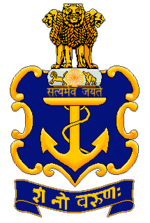
- It is headed by the President of India as its Supreme Commander.
- Indian Navy’s Motto is - Sam no Varunah (शं नो वरूण:) that means that the God of water, Varuna, should be auspicious unto us.
- Some of the earliest operations of the Indian Navy include its contribution in liberating Goa from Portugal in 1961.
- The Navy has developed as an admirable force with the making of the nuclear-powered ballistic missile submarine INS Arihant and several other ships.
- Indian Navy currently has one aircraft carrier, the INS Vikramaditya which was a former Russian ship that was commissioned into service in 2013.
- It operates three classes of submarines: Chakra (it has the nuclear-powered INS Chakra), Sindhughosh, and Shishumar.
- Marine Commandos or MARCOS is the special force unit of the Indian Navy, trained to conduct amphibious warfare, counter-terrorism, special reconnaissance, hostage rescue and asymmetric warfare.
- They were the first to respond to the 26/11 Mumbai terror attacks.
Important Facts For Prelims
Hornbill Festival
Hornbill Festival is celebrated in Nagaland to encourage inter-tribal interaction.
- It is one of the largest indigenous festival organised by the state government of Nagaland to promote tourism in the state.
- The festival is celebrated annually in the first week of December in order to preserve, protect and revive the uniqueness and richness of the Naga heritage.
- The festival is considered the “Festival of Festivals” in Nagaland.
- The festival is named after the bird – Hornbill which is the most revered and admired bird for the Nagas.
- The festival is a tribute to this bird, known for its qualities of grandeur and alertness.
- The bird is also closely identified with the social and cultural life of the Nagas, as reflected in various tribal dances, songs and folklores.
- Hornbill festival exposes the culture and tradition of the tribal people and reinforces the identity of the Nagaland.
Important Facts For Prelims
World Soil Day
Why in News
World Soil Day (WSD) is held annually on 5 December to highlight the importance of healthy soil and to advocate for the sustainable management of soil resources.
- The theme for WSD 2019 is ‘Stop Soil Erosion, Save Our Future’.
Key Points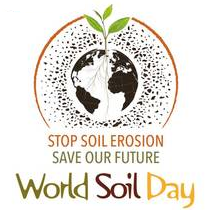
- It was recommended by the International Union of Soil Sciences (IUSS) in 2002. Food and Agriculture Organisation (FAO) has supported the formal establishment of WSD as a global awareness-raising platform under the leadership of the Kingdom of Thailand within the framework of the Global Soil Partnership.
- 5 December 2014 was designated as the first official World Soil Day by the UN General Assembly (UNGA).
- The date of 5 December was chosen because it corresponds with the official birthday of H.M. King Bhumibol Adulyadej, the King of Thailand, who officially sanctioned the event.
- FAO gives two awards in line with this day-
- The King Bhumibol World Soil Day Award- an annual award that honours individuals, communities, organizations and countries that organized remarkable and engaging World Soil Day activities or campaigns in the previous year.
- The Glinka World Soil Prize- an annual award for dynamic change-makers dedicated to solving one of our world’s most pressing environmental issue: soil degradation. It honours individuals and organizations whose leadership and activities have contributed, or are still contributing to the promotion of sustainable soil management and the protection of soil resources.

